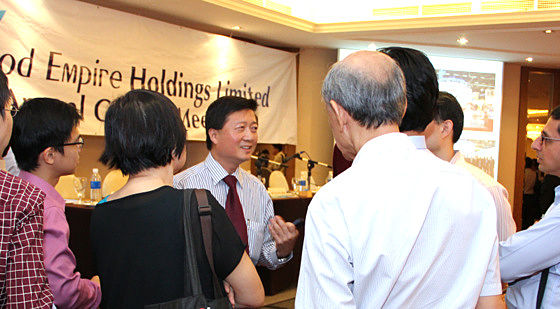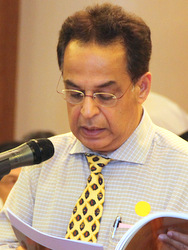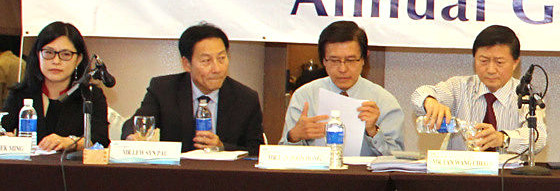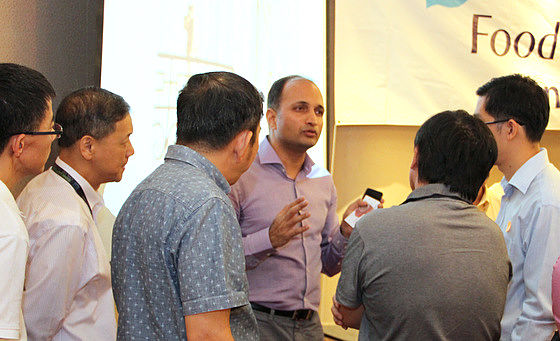 Time & date: 3 pm, 23 April 2014.
Time & date: 3 pm, 23 April 2014.
Venue: Riverview Hotel.
 Executive chairman Tan Wang Cheow speaking with shareholders after the AGM.
Executive chairman Tan Wang Cheow speaking with shareholders after the AGM.
Photos by Ong Chin Keet
Food Empire's profitability took a knock in 2013 and the company has encountered more challenges in 1Q of this year as a result of a political crisis engulfing Ukraine, one of its key markets for 3-in-1 coffee.
The Russian ruble fell against the USD during the crisis, and will lead to some forex loss for Food Empire, whose No.1 market is Russia.
Amid these developments, Food Empire's share price has corrected to 38.5 cents recently from 64 cents as at end-3Q2013.
Does this present a buying opportunity? Some shareholders were talking about it among themselves at the AGM, considering that Food Empire is an entrenched leader in its key markets and has tremendous brand equity value.
At the formal Q&A session, shareholders wanted to know more about the 2013 performance.
Here are highlights of the session:  Shareholder Mano Sabnani.Q: Profit before tax for beverage segment fell sharply in 2013 (from US$20.1 m in 2012 to US$10.5 m in 2013). Is there a margin squeeze? How much of the fall is attributable to expenses for the greenfield projects?
Shareholder Mano Sabnani.Q: Profit before tax for beverage segment fell sharply in 2013 (from US$20.1 m in 2012 to US$10.5 m in 2013). Is there a margin squeeze? How much of the fall is attributable to expenses for the greenfield projects?
(In comparison, "Others" segment did OK with revenue up 15% and profit before tax up from US$1.5 million to US$2.3 m).
Mr Tan Wang Cheow, executive chairman: Overall profitability came down by over US$8 million. We had forex loss of over US$2 million, start-up cost for greenfield projects of US$1.5 million, and losses in new markets/emerging markets -- Africa, Malaysia, Myanmar, the Philippines, Vietnam.
At end-2012, the ruble was 30.4 to a USD. At end-2013, it was 32.7. The depreciation was 9-10%.
Normally, we would raise selling prices to counter the fall in the currency. But we have 2 competitors -- Kraft and Nestle -- which were fighting hard for market share, and we couldn't change our pricing.
Q: Your assets and liabilities in the beverages section have gone up. What are the reasons?
Mr Tan: In Nov 2012, we started a factory in Ukraine and in 2013 we added some warehouses there. Last year, most of the new assets were two plants -- a non-diary creamer plant with 32,000 tonne capacity in phase 1 and our budgeted capex is US$14-15 million.
Next door to it is our new snacks factory which will take up almost US$9 million.
On top of that, we have a blending and packaging plant in Klang, taking up about US$14 million. Currently, we are building a coffee plant in India that will cost about US$22 million.  L-R: Tan Guek Ming (non-executive director), Lew Syn Pau (independent director), Tan Joon Hong (chief operating officer), Tan Wang Cheow (executive chairman).
L-R: Tan Guek Ming (non-executive director), Lew Syn Pau (independent director), Tan Joon Hong (chief operating officer), Tan Wang Cheow (executive chairman).
Q: Is the work on these projects going well?
Mr Tan: Let me show you some pictures of the plants.
We will do a lot of OEM -- there are many opportunities even though there are many competitors. We are aiming for high quality products of the standard of Pringles of Belgium, not Pringles of Asia.
We won't buy 100% from our own factory.
We have just got an operating licence for our packing plant in Klang and will start operating in May to service all our markets where we do not have factories. With the Klang factory up and running, we will rationalise the production in Johor and Singapore.
Q: On page 62 of the annual report, there's an item -- 'other operating expenses'. It's US$72 m, not a small amount. It's gone up from US$60.3 million in 2012. Should there not be a note to explain what this item is made up of?
Mr Tan: Page 101 has a breakdown and gives you an idea of the operating expenses. There are only 3-4 main items, with the majority being A&P. Freight costs and manufacturing costs were stable year on year. Legal and professional fees amounted to US$2.3 m, partly because we bid for a company in Korea.
To give you the details, A&P was US$44 m, freight US6 m, manufacturing overheads US$5.5 m, legal fees US$ 2.25 m, office upkeep US$2.9m, travel US$1.6 m, the rest are small expenses. L-R: Sudeep Nair (CEO), William Fong (CFO), Ong Kian Min (independent director), Boon Yoon Chiang (non-executive director), Koh Yew Hiap (non-executive director).
L-R: Sudeep Nair (CEO), William Fong (CFO), Ong Kian Min (independent director), Boon Yoon Chiang (non-executive director), Koh Yew Hiap (non-executive director).
Q: Operationally and logistically, how has the Russia/Ukraine political crisis affected your operations there?
Sudeep: In Russia, no problem but in Ukraine, we have held back on promotions. We wouldn't push for sales at this stage. We just make sure that stores don't run out of our stock. If some distributors are delaying payments, we will be careful about delivering more goods to them. CEO Sudeep Nair, who is largely based in Russia, speaking with shareholders after the AGM.
CEO Sudeep Nair, who is largely based in Russia, speaking with shareholders after the AGM.
Recent stories:
FOOD EMPIRE: Insights into its current transition phase -- and future






